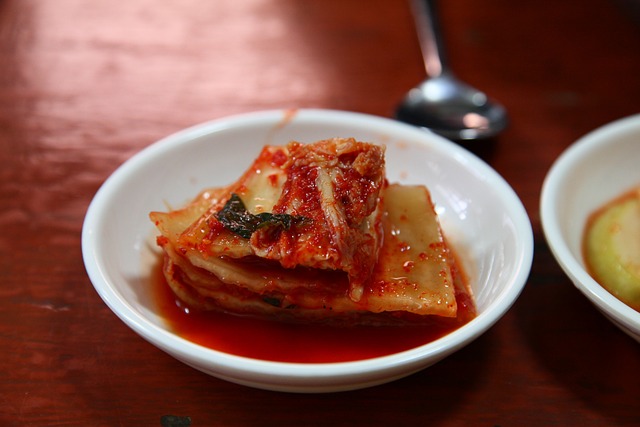Do Fermented Vegetables Cause Stomach and Esophageal Cancer?

A lot of websites tout the benefits of fermented vegetables, like sauerkraut, fermented pickles and kimchi. And research does suggest some health benefits with fermented vegetable consumption. However, a number of large studies have also documented significant increases in esophageal and stomach cancer for individuals that consume fermented vegetables on a regular basis. As such, it’s worth reviewing the literature in order to understand any potential health concerns.
Fermenting foods has long been a form of preservation to maintain foods in an edible form for longer periods of time. The practice of fermenting vegetables spans back through multiple cultures, including in Europe and Asia. More commonly fermented vegetables include cabbage, as sauerkraut and kimchi, cucumbers as pickles, olives, green beans and beets.
Potential Benefits
More recently, the benefits of fermented vegetables have received some attention in the medical literature (Lavefve 2019). Fermented vegetables contain high levels of beneficial bacteria, including lactobacillus, which may act as a probiotic. Of the fermented vegetables, kimchi is the best studied and has been shown to have both anti-obesity effects and beneficial effects on blood sugar. In general, kimchi appears to have antioxidant, anti-inflammatory and immune-supporting properties.
Stomach and Esophageal Cancer—A Brief Overview
Stomach Cancer
Worldwide, gastric cancer is one of the most common types of cancer. Gastric cancer is also quite lethal, with gastric cancer being the fourth most common cause of cancer-related death (Machlowska 2020). Risk factors for gastric cancer include genetics; alcohol and tobacco use; broiled, charbroiled and smoked meat consumption and pickled (or fermented) vegetables (Kim 2014).
Esophageal Cancer
The esophagus is the tube that connects the mouth to the stomach. Esophageal cancer is the eighth most common cancer in the world and also carries a high mortality rate, making it the sixth leading cause of cancer-related death (Uhlenhopp 2020).
The most recognized risk factors for esophageal cancer include lower socioeconomic status, alcohol consumption, tobacco use, hot beverage consumption and nitrosamines—commonly found in cured meats. Cancer of the esophagus is often caused by chronic acid reflux which is often experienced as heartburn. Over time, stomach acid that reaches the esophagus continues to damage the cells lining the throat, causing the cells to become cancerous. For individuals experiencing acid reflux, effective treatment can mitigate potential cancer risks.
Fermented Vegetables, Stomach and Esophageal Cancer
Asian Studies
The vast majority of the studies showing increased risks of cancer associated with fermented vegetable consumption come from Asia. Asia has some of the highest consumption levels of fermented vegetables leading to their relevance in the cancer research literature.
Meta-analyses from Asia have continued to show potential stomach and esophageal cancer risks with the consumption of fermented vegetables. An analysis of the Korean population found for every 40 grams of daily fermented vegetable intake, stomach cancer risks increased by 15% (Yoo 2020). A meta-analysis of the Chinese population found that fermented vegetables were the likely cause of more than half of stomach cancers (Duan 2021). An older analysis looking at both Japanese and Korean populations found that regular consumption of fermented vegetables increased stomach cancer risks by 28% (Kim 2010).
As for cancer of the esophagus, the most recent meta-analysis found that individuals who had higher consumption of fermented vegetables had over twice the risk as compared to those that consumed lower amounts (Yan 2018). An older study found basically the same thing, showing that fermented vegetable consumption yielded twice the risk of esophageal cancer (Islami 2009).
European and American Studies

American and European studies on fermented vegetable intake and cancer were all individual studies. Currently, there are no reviews exploring the overall risks in Western populations. The main fermented vegetable that has been studied is sauerkraut. Pretty much all of the studies failed to find an association between cancer risk and sauerkraut consumption (Jedrychowski 1986, Botterweck 1998, Morrison 2020, Boeing 1991).
As for esophageal cancer, the majority of American and European studies lump sauerkraut in with raw and cooked vegetable consumption which was then found to be protective against esophageal cancer. Consuming non-fermented vegetables has generally been correlated with reductions in cancer risk, so combining fermented vegetables with raw and cooked vegetables could easily obscure the results.
Differences in Consumption Between Asia and Western Countries
The differences between Asian and Western studies may be due to the differences in the amount of fermented vegetables consumed. In Germany, where the most sauerkraut is consumed in Europe, online sources claim that average consumption is around two pounds per year. These levels are still quite low when compared to Asia.
In South Korea, kimchi consumption averages around 77 pounds per year (Choi 2020). In some areas of China, fermented vegetables are also consumed on a daily basis, likely in much higher quantities than in Europe or America (Yang 1980). It’s likely that if fermented vegetables do cause cancer, higher consumption is necessary for the effects to become significant.
Possible Causes of Increased Cancer Rates from Fermented Vegetables
Older research out of China described common family fermentation methods that lasted for months. They also described batches frequently developing mold and still being consumed (Yang 1980). Testing also showed high levels of mold or fungal contamination in fermented vegetables. Animal studies that fed rats fermented vegetables, found numerous cancers and precancerous lesions, where control rats were cancer free (Yang 1980).
While fungal contamination could be a problem in some types of fermented vegetables, kimchi is often processed for shorter periods of time or at low temperature, minimizing the risks for fungal growth. And studies on kimchi consumption still appear to be linked to stomach and esophageal cancer. A recent study explored another possible carcinogen: enzymes produced by certain bacteria involved in the fermentation process, including β-glucuronidase and β-glucosidase. In the study, bacteria from kimchi were isolated and grown in culture. The cultures were then evaluated for the presence of the enzymes. Over half of the bacteria found in kimchi produced one or both of the carcinogenic enzymes, raising concerns (Lee 2021).
A separate study also found that stomach cancer patients that consumed fermented vegetables had significant disruptions in their folate biosynthesis pathway (Yang 2020). While the study needs verification, low folate levels are known to increase the risk and severity of gastric cancer (Lee 2014).
Conclusion
While it looks like there are increased risks for esophageal and stomach cancer associated with fermented vegetables, the risk is only present when consumed daily in large quantities. If you enjoy fermented vegetables on occasion, I would not be concerned. It’s also possible that by adding different bacteria to the fermentation process that the cancer risk could be reduced or eliminated. However, I am unaware of any companies that are pursuing such an approach to fermented vegetable production.



